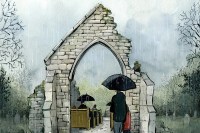When an unpublished diary or book of letters from a celebrated writer comes to the attention of the reading public nowadays, there is often a sense that a game is being played between two parties. Writers — being the megalomaniacs they invariably are — dream of grandiosity and world domination, therefore these documents are predominately contrived from the moment pen goes to paper. They are for potential posterity, and a legacy, rather than any truthful insights. The readers readily take part in this charade, hoping to catch their idols off guard in the process.
As Consciousness is Harnessed to Flesh, Diaries 1964-1980 ostensibly plays along in the aforementioned game, but there are glimpses within these fragmented, and at times, difficult diary entries, that simultaneously reveal a weaker side to the self-confident persona which Susan Sontag convincingly projected to her readers over her successful career as an essayist, novelist and film director.
These journal jottings were scribbled down over a 16 year period. In that time, Sontag was something of a high-priestess of counter-culture, a keen spokesperson for the feminist movement, and a regular activist for the New Left. It was in these years that Sontag produced: Against Interpretation, a provocative book of essays on contemporary culture, Death Kit, her brilliant second novel, which explored the recess of the American conscience, and On Photography, a ground breaking book of essays that analysed how photographs had come to influence the human mind in the modern world.
These were the years before Sontag had become a parody of the elitist culture that she had once so brilliantly argued against.
Despite Sontag’s public displays of bellicose in debates and interviews, over several decades, her diary entries reveal a woman who was uneasy in the company of others: ‘I suffer from a chronic nausea- after I’m with people. The awareness (after awareness) of how programmed I am, how insincere, how frightened.’
The only cure for this constant disquietude, it seems, was an insatiable appetite for culture. Much of the content here is comprised of lists: films and books that must be consumed obsessively. By complementing herself of keeping abreast with culture — both past and present — Sontag thus brought comfort, calmness, and philosophical meaning to a life which was otherwise plagued by pain and anguish. And yet she was aware that this behaviour was unusual. In one entry she admits, that ‘I would be more myself if I would consume less of what others produce.’
If Sontag’s previous book in this trilogy, Reborn: Journals and Notebooks, 1947–1963, reveal the lurid details of her first sexual escapades with women, (she was never 100 per cent open about her own bisexuality) then these diaries reveal a desire for a love-life she imagined, but could not attain. She spends much of the late 1960s in self-loathing rants about her own inadequacies as a lover, lamenting the loss of her ex-partner, and Cuban playwright, María Irene Fornés, who broke her heart: ‘[She was] the first person to act to me in a loving manner…she rejected me because I was no good in bed.’
It’s when Sontag enters into confessional mode that the material is both entertaining, yet equally disturbing. She describes how as a child, she fantasised of being captured by ‘the Nazis or the Japs, and remaining steadfast + stoical under torture.’ She also delineates her invigorating rage, jealousy, and sexual attraction she felt towards her mother growing up: ‘One of the things I felt pleased my mother was an erotic admiration. She played at flirting with me, turning me on (+ I was turned on too).’
Sontag found the majority of her friends and fellow writers insufferable, declaring that she has spent almost all her time ‘with mediocre minds’. The exception to this rule, is her
acquaintance in the mid 1970s, with the exiled Russian poet, Joseph Brodsky, someone she finally considered to be her intellectual equal. Her son, David Rieff — the editor of this book
— also brought an enormous stability to her life. In one instance she writes that she would have committed suicide, if it were not for his presence.
These scattered ramblings show Sontag for the boorish, serious, solipsistic, fascinating, well read, and highly intelligent individual she was. No major surprises, but as these literary games go,
this is indeed a highly insightful, and rather interesting one to play.
Susan Sontag: As Consciousness is Harnessed to Flesh, Diaries, 1964-1980 is published by Penguin
£10.99





Comments